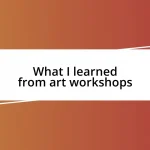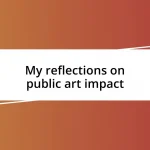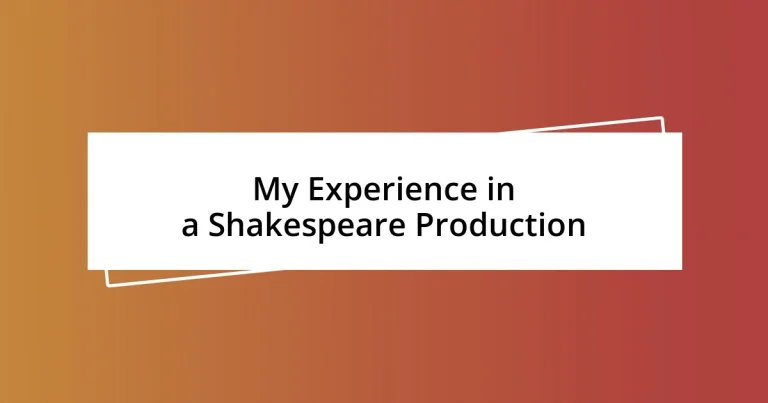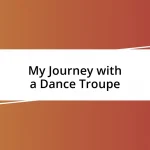Key takeaways:
- Engagement with Shakespeare’s texts offers a rich emotional journey, highlighting the significance of individual interpretation and collaboration within a production.
- Preparation for auditions entails thorough research, practicing monologues with feedback, and ensuring adequate rest for optimal performance.
- Overcoming performance anxiety is aided by connecting with fellow cast members, using relaxation techniques, and channeling nervous energy into the performance.
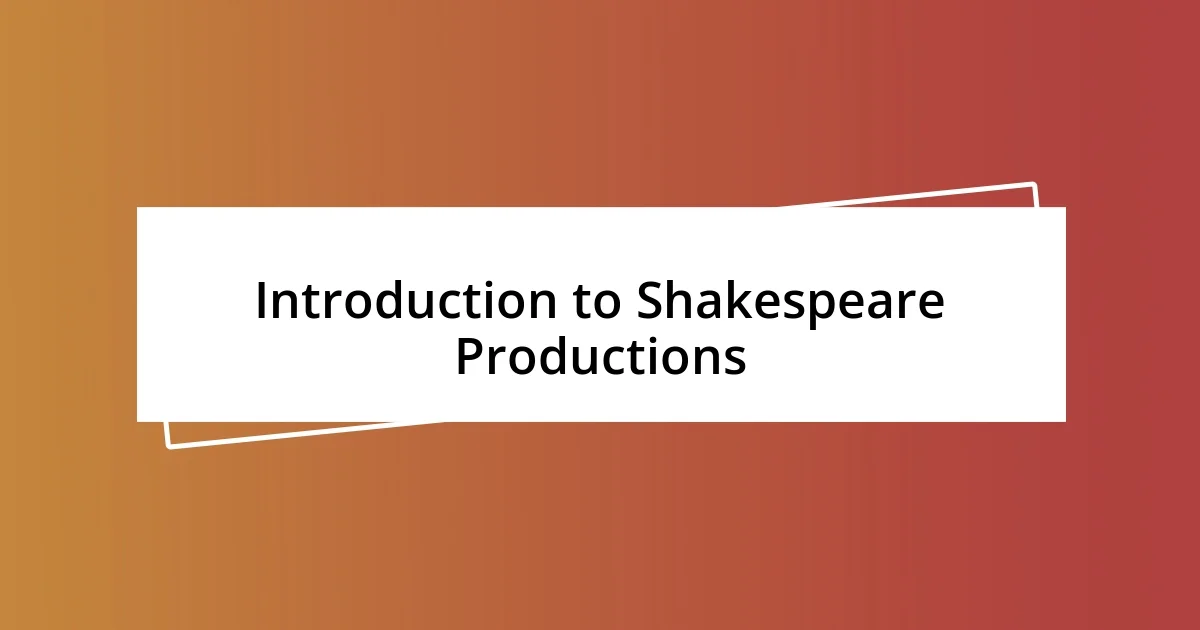
Introduction to Shakespeare Productions
Stepping into a Shakespeare production is like entering a world where language dances and emotions run deep. My first experience in such a setting was electrifying; the moment the curtain rose, I was swept away by the richness of the characters and their timeless struggles. Have you ever wondered how words written over 400 years ago can still resonate so powerfully today?
Shakespeare’s plays are not just historical artifacts; they are living texts that speak to the human condition. Each performance brings a unique energy that transforms the familiar into the extraordinary. I remember a pivotal scene from “Macbeth” where the air was thick with suspense, and the audience was collectively holding their breath. The raw portrayal of ambition and guilt left an indelible mark on my perspective about the depths of human desire.
Engaging with Shakespeare’s work is more than just reading lines; it’s an emotional journey that unfolds before your eyes. Being part of a production taught me the importance of collaboration and interpretation in theatre. It’s fascinating how each actor brings their own life experiences to the table, enriching the story and creating a shared experience that no one can replicate. This interplay of creativity makes every Shakespeare production a unique exploration of the heart and mind.
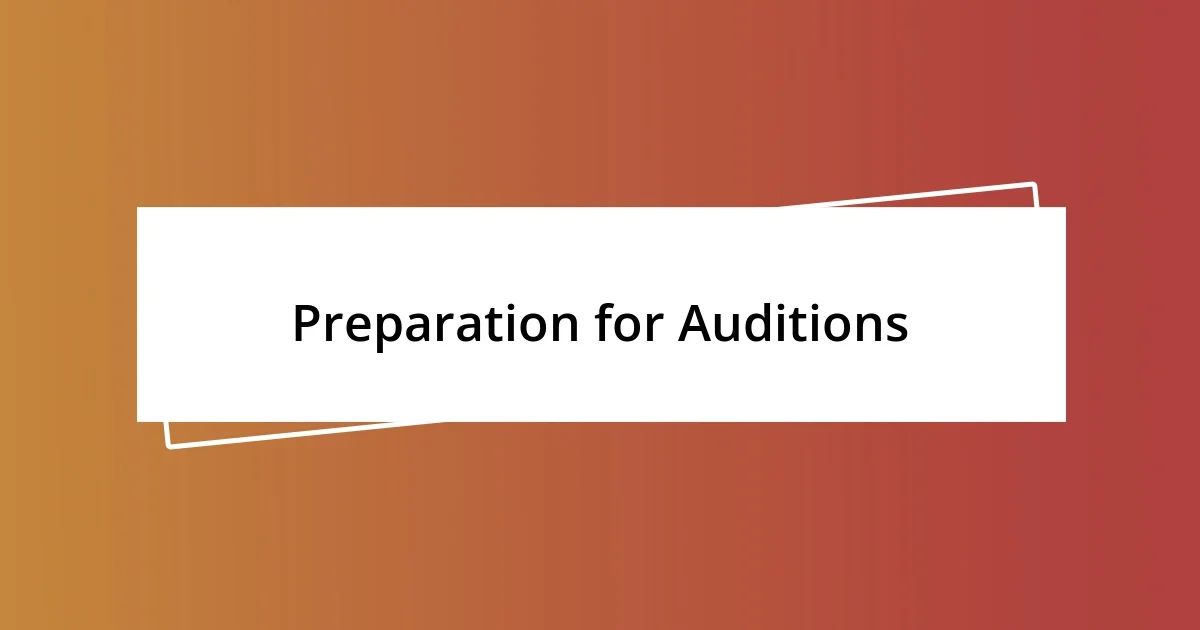
Preparation for Auditions
When preparing for auditions, I found that research makes all the difference. I immersed myself in the world of the character I wanted to portray, digging into their motivations and relationships. For example, studying Lady Macbeth’s transformation from a determined spouse to a conflicted figure deepened my understanding. Have you ever felt like you needed to step into someone else’s shoes to truly understand their path? It’s a transformative experience that resonates beyond the lines.
Practicing monologues is another crucial aspect I embraced. I remember rehearsing my chosen piece in front of friends to get feedback, which really helped refine my delivery. Their reactions, laughter in the right places, or silence when the emotion hit, were invaluable. This process allowed me to discover layers within the text that I hadn’t seen before. Did you know that knowing the historical context behind a character can enhance your performance? It truly does!
Finally, I can’t stress enough the importance of a good night’s sleep before the audition. I learned this the hard way after a late-night cram session left me exhausted and frazzled. Arriving well-rested gave me the confidence to connect with the material. There’s magic in being clear-headed during those intense moments in the spotlight!
| Preparation Method | Personal Insight |
|---|---|
| Research | Understanding character depth transforms your performance. |
| Practicing Monologues | Rehearsing with feedback reveals emotional layers in the text. |
| Getting Enough Sleep | Rest leads to clarity and confidence on audition day. |
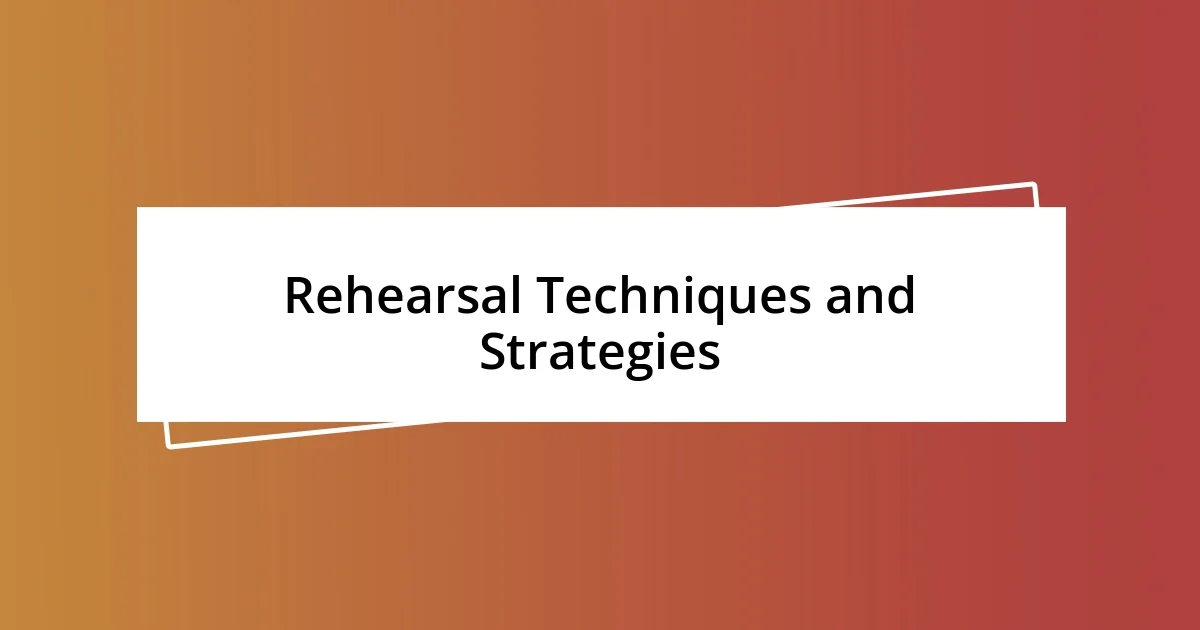
Rehearsal Techniques and Strategies
In the rehearsal process, I learned that flexibility is just as important as preparation. One memorable strategy was the use of improv exercises, which pushed me out of my comfort zone and helped me connect with my character on a deeper level. I recall one session where we had to act out scenes in completely different styles—one moment we were classic tragedy, the next a slapstick comedy. This not only opened my mind to new interpretations but also fostered a hilarious camaraderie among cast members. Have you ever found unexpected creativity emerging from a seemingly chaotic environment? I can attest to its magic.
Here are some techniques that I found effective during rehearsals:
- Improvisation Games: They break the ice and encourage spontaneity, vital for authentic performances.
- Table Work: Discussing the script as a group deepens character understanding and strengthens ensemble dynamics.
- Blocking Exercises: Practicing movement on stage early on helps solidify spatial relationships that enhance the story.
- Vocal Warm-ups: Simple exercises can ease nerves and prepare the voice for Shakespeare’s lyrical language.
- Scene-Partner Feedback: After performing a scene, exchanging thoughts elevates everyone’s performance and fosters trust.
In my experience, these strategies made rehearsals not only more productive but incredibly enjoyable! Each rehearsal became a chance to explore, experiment, and evolve, ultimately leading us closer to the final performance. Isn’t it fascinating how each practice session unveils new layers of character and story?
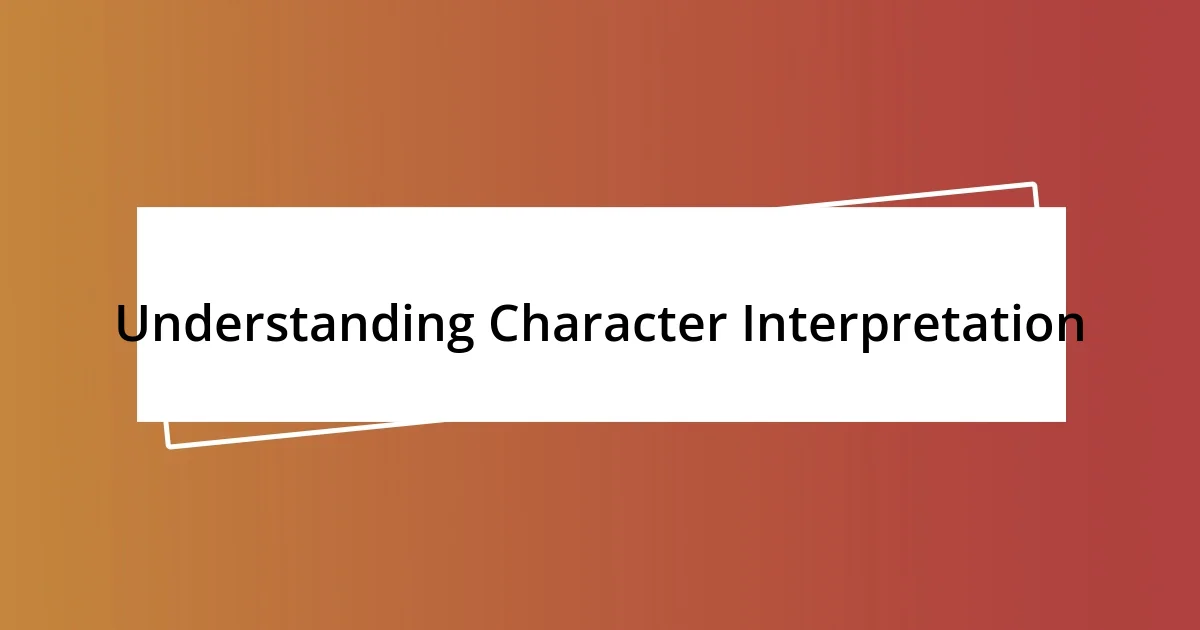
Understanding Character Interpretation
Understanding character interpretation is a journey I relished during my Shakespeare production experience. One memorable moment came as I delved into the psyche of Hamlet. As I explored his philosophical nature, I asked myself, “What would it feel like to grapple with such profound existential questions?” That deep dive led me to a revelation: portraying Hamlet isn’t just about delivering lines; it’s about embodying his turmoil and confusion.
I found that truly knowing a character demands an emotional investment. One day in rehearsal, I was playing the role of Desdemona, and I felt an overwhelming rush of vulnerability when delivering the “Willow Song.” Suddenly, the weight of her heartbreak resonated within me. Have you ever had a moment where a character’s pain mirrored your own? That emotional connection can transform not just how you portray the character, but how the audience sees and feels for them.
Engaging in discussions with fellow cast members also enriched my interpretation process. Collaboratively analyzing motivations and relationships unlocked perspectives I hadn’t considered. I recall a conversation about the nuances in portents throughout “Macbeth,” where different interpretations created a tapestry of depth. Isn’t it remarkable how sharing insights can elevate our understanding of a character’s journey? Each dialogue brought us closer to the heart of the narrative, deepening our performances immeasurably.
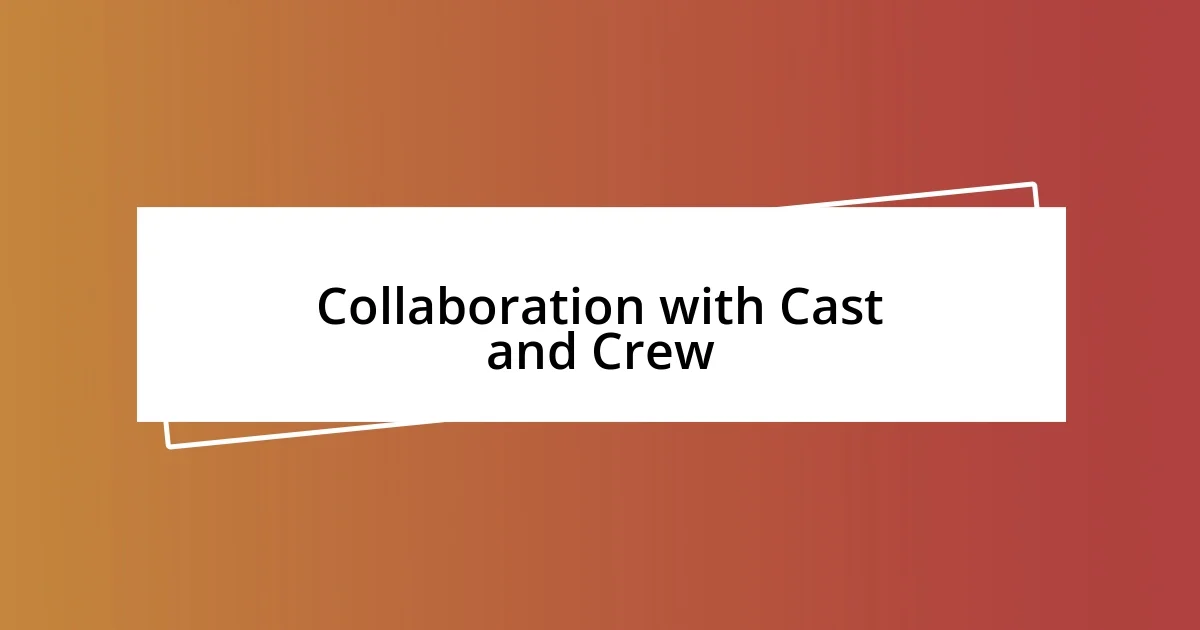
Collaboration with Cast and Crew
The collaboration with the cast and crew was a pivotal aspect of my experience in the Shakespeare production. I remember one particular rehearsal when our director brought everyone together to share their perspectives on a scene. As we exchanged ideas, I felt such a powerful synergy—everyone was eager to contribute, and that collective energy infused the moment with creativity. It was a reminder that when we all bring our unique insights to the table, the art we create becomes richer. Does it surprise you how essential teamwork is in the performing arts?
As we dove deeper into the rehearsal process, I forged unexpected friendships that extended beyond the stage. One evening, wrapped in the camaraderie of our post-rehearsal discussions, we tackled tough character dilemmas together over pizza. This informal setting fostered an environment where vulnerability thrived, and jokes about missed lines quickly turned into profound conversations about character motivations. Each laugh and revelation reinforced our bond, and I could feel our performances become more intertwined as a result. Have you ever found that laughter can be a bridge to understanding?
The technical crew also played a significant role in shaping our vision of the production. I’ll never forget the light designer’s input during a scene where I was supposed to convey a moment of despair. He suggested a subtle change in lighting that shifted the whole emotional tone. Suddenly, my character’s anguish felt so much more palpable. It struck me that everyone, from actors to stagehands, contributes uniquely to the story. Their insights often lead to unexpected discoveries and deeper emotional resonance in our performances. Isn’t it amazing how collaboration can illuminate aspects of a story we might overlook working in isolation?
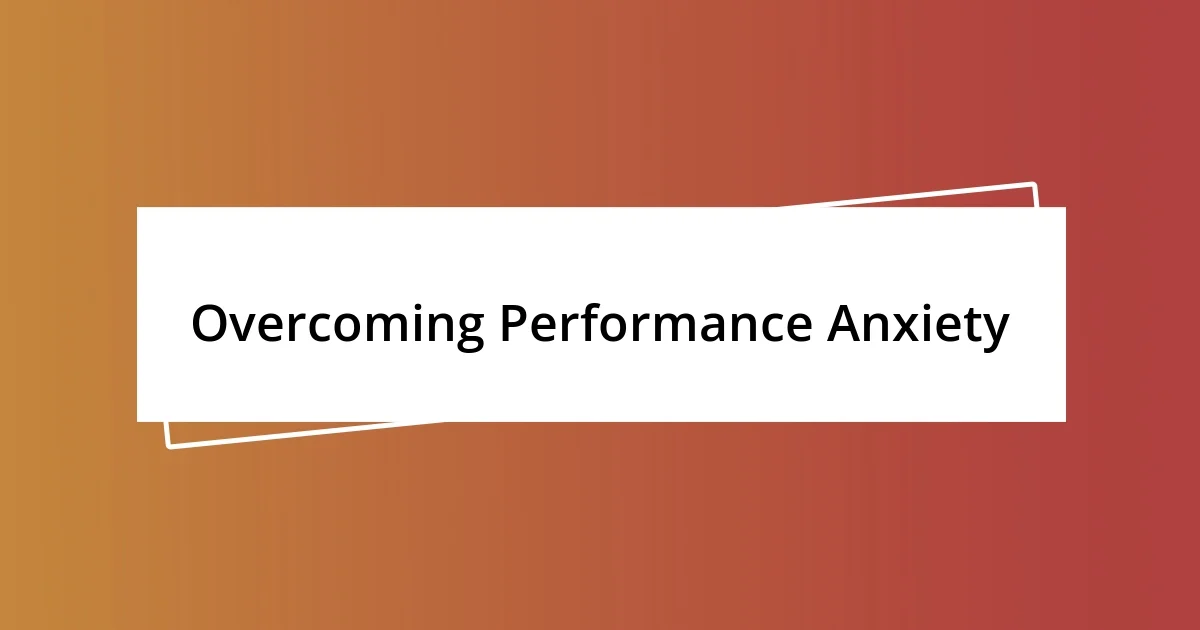
Overcoming Performance Anxiety
Performance anxiety is something every actor grapples with, and I certainly did in my Shakespeare production. Before stepping onto the stage, I often found my heart racing and palms sweaty. I realized early on that channeling that nervous energy into my performance could transform anxiety into adrenaline. Have you ever experienced that thrilling moment right before going on stage, when excitement and fear blend into one? Harnessing that feeling became my secret weapon.
During my first major scene, nerves hit hard. I remember pacing backstage, replaying my lines in my mind, questioning whether I could truly embody the character. A fellow actor noticed my unease and suggested a deep breathing technique. I took a moment to inhale slowly, letting the breath fill my lungs, and as I exhaled, I felt some of that tension melt away. It struck me that sometimes, simple techniques can ground you. How often do we overlook the power of a deep breath in moments of stress?
Ultimately, I discovered that connecting with my fellow cast members was crucial in overcoming my anxiety. Before performances, we’d huddle up for brief pep talks, sharing words of encouragement and laughter. One night, we formed a circle and recited our character’s most significant lines together, feeling the shared energy build. That sense of unity made me realize that I wasn’t alone on stage. Isn’t it comforting to know that we can lean on others when facing our fears? Through collective support, I learned that facing performance anxiety becomes a little easier when you’re surrounded by people who understand what it’s like to stand in the spotlight.
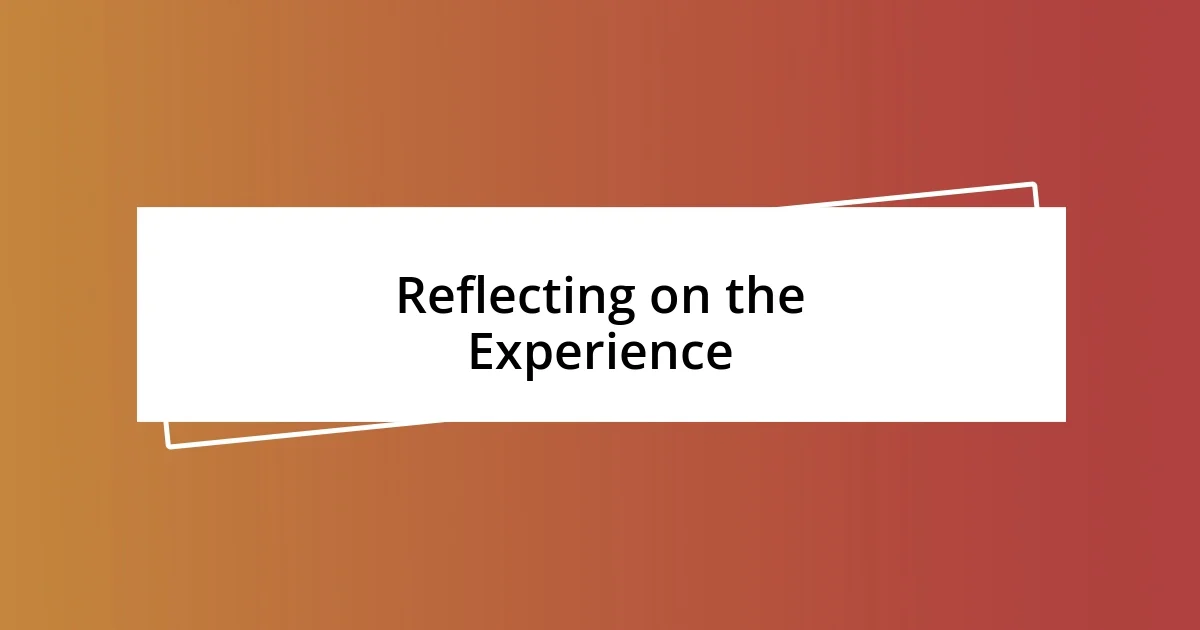
Reflecting on the Experience
Reflecting on my experience in the production, I can’t help but feel a wave of gratitude for the journey it took me on. I remember standing backstage before my final performance, surrounded by the familiar sounds of last-minute preparations and the buzz of anticipation. It was a moment of clarity as I absorbed the culmination of countless hours of rehearsal and collaboration. Have you ever found yourself reflecting on the path that brought you to a significant moment? It’s incredible how every stumble and triumph becomes a part of the larger narrative.
As I think back on it, I realize how deeply the experience altered my perspective on vulnerability. I shared so many personal moments with the cast, exposing fears and insecurities that I’d often keep hidden. I recall a specific evening when I shared my struggles with portraying a complex character over coffee. My openness encouraged others to share their own experiences, creating a powerful circle of trust and support. These heartfelt exchanges made me appreciate how vulnerability can strengthen bonds and enhance performances. Isn’t it amazing how sharing our fears can foster such profound connections?
Looking back, I’ve come to understand that the essence of this experience wasn’t merely about the final curtain call. The friendships made, the lessons learned, and the laughter shared have left an indelible mark on my heart. It’s like each moment knit us closer together, creating a tapestry of memories that I can carry with me. How often do we recognize that every experience, no matter how challenging, shapes who we become? Those late-night discussions and shared anxieties transformed into a collective understanding that I’ll always cherish.



